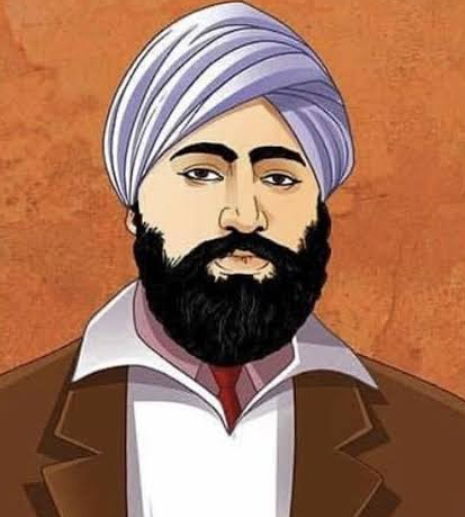The one who took the revenge of Jallianwala Bagh massacre.


I did it because I had a grudge against him. He deserved it. He was the real culprit. He wanted to crush the spirit of my people, so I have crushed him. For full 21 years, I have been trying to wreak vengeance. I am happy that I have done the job.- Udham Singh on O’Dwyer
Jallianwala Bagh turned him into a revolutionary, and soon he left for the US. In the early 20s, he came into contact with leaders of the Ghadar Party in US, and around this time was influenced by the militant activities of the Babbar Akalis.
Responding to the call of Bhagat Singh in 1924, he bought along with him some associates, and revolvers smuggled in. However he was arrested by the police in Amritsar, for possesion of unlicensed arms, and was sent to prison for 4 years.
On his release, he worked as a signboard painter in Amritsar. It was during this time, he assumed the pseudonym of Ram Muhammad Singh Azad, to state all Indians are one, and the goal was freedom from British rule.
Udham Singh was deeply influenced by Bhagat Singh, and would invariably carry his portrait all the time with him. Under constant surveillance by the police, he escaped to Kashmir for some time, to evade them.
In 1934, he escaped to Germany, and roamed all over the continent, before reaching England. His sole aim was to assassinate Dwyer whom he held responsible for the tragedy at Jallianwala Bagh and the atrocities that followed
He was inspired a lot by the Russian Revolution, and often carried a Punjabi booklet on the revolution with him. He finally got a chance to avenge Jallianwala Bagh, the revolver to him was given by Puran Singh, hailing from Punjab’s Malwa region.
March 13,1940, Caxton Hall, London
A building located near to Westminster, which primarily hosted political events. It’s other use for high society celebrities to register a civil marriage. On this date, though it would be creating a history in another way.
A joint meeting of the East Indian Association and Central Asian Society( now Royal Society for Asian Affairs) was scheduled to be held. One of the speakers was Michael O’Dwyer, from Ireland’s Tipperary County, son of a poor farmer, he had joined the Indian Civil Service.
He would however be more notorious for his conduct as Lt.Governor of Punjab from 1912-19. In a region that was burning with protests against British imperialism, Dwyer, was noted for his harsh crackdowns and often draconian laws.
Nothing however would beat the brutality of what happened on April 13,1919 when 379 unarmed civilians were massacred at what was called Jallianwala Bagh, a walled garden in Amritsar. The massacre at Jallianwala was led by Brig.Gen Reginald Edward Dyer.
Though it was Dyer who led the massacre at Jallianwala Bagh, he got full support from O’Dwyer, who claimed it was necessary. And add to it, as Lt.Governor of Punjab, he imposed a draconian military law, where civilians were asked to crawl on their knees, flogged in public.
As O’Dwyer took to the stage, Udham Singh took out his revolver and fired twice. O’Dwyer collapsed, the man who shot him did not even attempt to flee and surrendered to the police.
‘I don’t care, I don’t mind dying. What Is the use of waiting till you get old? This Is no good. You want to die when you are young. That is good, that Is what I am doing’- Udham Singh
On April 1, 1940, Udham Singh was charged with murder of O’Dwyer. On June 4, 1940, he stood for trial at the Central Criminal Court, in London’s Old Bailey, before Judge Atkinson.
It was one of the most memorable trial, ever, when Atkinson asked him, why no sentence should be passed on him. Udham Singh’s reply.
He claimed his fight was not against the English people, it was against the conduct of the British Government and British imperialism. When he finished his speech, he raised slogans against the British rule and spat on the solicitor’s desk before leaving.
Udham Singh’s statement in court.
He claimed his fight was not against the English people, it was against the conduct of the British Government and British imperialism. When he finished his speech, he raised slogans against the British rule and spat on the solicitor’s desk before leaving.
July 31, 1940, Udham Singh, became a martyr hanged for the cause of India’s freedom at Pentonville Prison in London. The man who spent 21 years to get the opportunity to take revenge for the perpetrator of the Jallianwala Bagh Massacre.
Mahatma Gandhi condemned Udham Singh’s act, calling it an act of political insanity, while Jawaharlal Nehru writing in the National Herald regretted it. However the Punjab section of the Congress backed him and refused to condemn the assassination.
The Hindustan Socialist Republican Army(HSRA), supported Udham Singh, and condemned Gandhi’s statement. Udham Singh found support in the international media too, with the Times calling his act, an expression of pent up fury among the downtrodden. #ShaheedUdhamSingh
On his request his ashes were sent back to India in 1974, and sent to his hometown of Sunam in Punjab. One of the great sons of India, had fired another shot for the cause of freedom, and became a true martyr for the nation. #ShaheedUdhamSingh
Credit – @Sadaashree
DISCLAIMER: The author is solely responsible for the views expressed in this article. The author carries the responsibility for citing and/or licensing of images utilized within the text.
